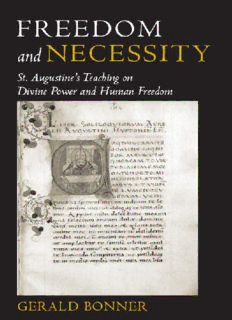
Freedom and Necessity: St. Augustine's Teaching on Divine Power and Human Freedom PDF
Preview Freedom and Necessity: St. Augustine's Teaching on Divine Power and Human Freedom
FREEDOM and NECESSITY FREEDOM AND NECESSITY St. Augustine’s Teaching on Divine Power and Human Freedom GERALD BONNER The Catholic University of America Press Washington, D.C. Copyright © 2007 The Catholic University of America Press All rights reserved The paper used in this publication meets the minimum requirements of American National Standards for Information Science—Permanence of Paper for Printed Library Materials, ANSI Z39.48-1984. ∞ Library of Congress Cataloging-in-Publication Data Bonner, Gerald. Freedom and necessity : St. Augustine’s teaching on divine power and human freedom / Gerald Bonner. p. cm. Includes bibliographical references and index. isbn-13: 978-0-8132-1474-0 (pbk. : alk. paper) isbn-10: 0-8132-1474-2 (pbk. : alk. paper) 1. Augustine, Saint, Bishop of Hippo. 2. Grace (Theology)—History of doc- trines—Early church, ca. 30–600. 3. Free will and determinism— Religious aspects—Christianity—History of doctrines— Early church, ca. 30–600. 4. Predestination—History of doc- trines—Early church, ca. 30–600. I. Title. BR65.A9B626 2006 234´.9092—dc22 2006019364 The author’s English spelling has been altered by the Catholic University of America Press without reference to him, to conform to its own norms. To all my fellow-students over the years and especially to Jane CONTENTS Prefatory Note ix Abbreviations and Sources xi Introduction 1 1. The Problem 17 2. The Evidence 34 3. The Nature of Freedom in the Mind of Augustine 49 4. Freedom and Responsibility 66 5. Augustine’s Final Theology of Freedom 81 6. Divine Predestination and Jesus Christ 97 7. Conclusion 118 Select Bibliography 133 Index 139 vii PREFATORY NOTE the purpose of this work is to set out, as fairly as I can, Augustine’s final understanding of divine predestination and his attempt to recon- cile it with his continued assertion that free choice continues to exist in fallen human beings. I also wish to make clear how grim are the con- clusions which he draws from his doctrine of Original Sin, which to me seem irreconcilable with the Gospel message, but which are sup- ported by texts of Scripture, including some words of Christ Himself, and which have been accepted by generations of Christians, who were not themselves lacking in sympathy and charity for other human be- ings. At the same time, I have attempted to remind the reader that Au- gustine’s thinking is not simply negative. Many years ago, in a study of Augustine’s theology, I remarked that “it would be possible, though it would require careful selection, to read widely in Augustine with- out ever considering his doctrine of Grace.”1 When considering Au- gustine’s eucharistic theology, his emphasis on love as the supreme virtue, and on the significance of the Word’s flesh-taking in the In- carnation for God’s dealings with humanity, one encounters a mood which might, in other circumstances, have led Augustine to greater hopes for the future of humanity than are found in the De Dono Per- severantiae and the (mercifully uncompleted) Opus Imperfectum contra Iulianum. Without subscribing to his thesis, I have much sympathy with Dr. P.-M. Hombert, Gloria Gratiae: Se glorifier en Dieu, principe et fin de la théologie augustinienne de la grâce. For similar reasons I have found myself convinced that the Pela- gians, to whom I am not naturally drawn, deserve more sympathy 1. St. Augustine of Hippo: Life and Controversies, 3rd ed. (2002), 389. ix
Description: